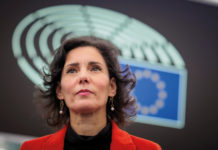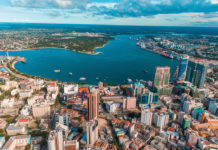Which are the most important economic sectors in Tanzania?
Tanzania’s economy is diverse and driven by several key sectors. Agriculture is crucial, contributing more than 25% of our GDP and employing over 65% of our population. The sector plays a key role in the trade relationship between Tanzania and Belgium contributing more than 50% of our exports to Belgium. Our agricultural exports include traditional products like coffee, tea, and cocoa, mostly exported in their raw forms. The government is focused on adding value to these products and calls on Belgian and European partners to invest in agro-processing and agritech. We also see significant potential in fertilizer production and environmentally friendly pesticides, areas where Belgium has more comparative advantage. Some Belgian companies are already exporting fertilisers to Tanzania, and there is room for further collaboration in this sector.
Manufacturing is another priority sector. Currently, it contributes 7% to our GDP, but we aim to increase this significantly. There are opportunities for Belgian investors in manufacturing sectors such as beverages, cheese, and agro-processing.
Additionally, our strategic location makes Tanzania a key logistics hub for neighbouring countries like the DRC, Rwanda, Burundi, Zambia, Malawi, and Uganda. Dar es Salaam port is essential for these countries, and investments in transport and logistics can greatly benefit from Belgian expertise and cooperation. Currently, the logistics sector constitutes more than 20 per cent of the Belgian investment in Tanzania. But the potential is still so huge.
As we know, Belgium is one of the key logistics hubs in Europe. Tanzania plays a similar role in Africa serving a larger part of the East and Central African countries. So, this is another area where more collaboration can be formed in terms of investment and technical cooperation. We thank the Government of Belgium and the European Union for all the support that they have indicated so far in bringing the ports of Antwerp and Dar es Salaam and other ports in Tanzania into more advanced cooperation
Tanzania is also rich in mineral resources, including gold, diamonds and critical minerals such as cobalt, graphite, nickel and rare earth metals. We recently participated in the EU raw materials summit where we highlighted our potential in critical minerals. The European Union has identified 34 critical minerals, out of which 22 have already been proven to exist abundantly in Tanzania. We are sure we have more than that. We thank our EU partners for their commitment to partner with us in undertaking a geological mapping in Tanzania that will help us to know the actual endowment of these resources. Belgium is our main market for diamonds, with over 95% of our diamonds sold in Antwerp. However, there is potential for more value-added products in the gemstone sector.
The health sector also offers significant investment opportunities, particularly in pharmaceuticals. Tanzania spends over one billion US dollars annually on importing pharmaceutical goods. We welcome Belgian investments in pharmaceutical manufacturing to reduce import dependency and meet local demand.
The banking and finance sector, particularly in rural areas, presents another investment opportunity. Many Tanzanians still lack access to banking services. Establishing financial facilities can attract a large customer base. The EIB Bank has already stepped in where it is collaborating with local financial institutions in initiatives targeting SMEs. We call upon other institutions to come in and take advantage of the huge potential that still exists.
Lastly, the real estate sector is booming. With a population of over 60 million people, there is an annual demand for more than 600,000 houses. This demand is especially high in Dodoma, our new capital city, which requires modern housing to accommodate officials and workers. Belgian expertise in green building technologies can make construction more cost-effective and efficient.
Which sector do you want to see developed in the next 10 years?
Under the leadership of President Dr. Samia Suluhu Hassan, our vision is to transform Tanzania into a vibrant economy that positively impacts the lives of our people. We aim to make Tanzania a hub for value-added goods by leveraging our abundant natural resources. In the next ten years, we want to add value to our agricultural products, mineral resources, and other locally produced goods, focusing on industrialization and manufacturing.
We are also emphasizing technology development for productivity enhancement. The government is committed to creating a favourable environment for technology transfer. In partnership with the European Union and other partners, we are working on several projects towards digital transformation in Tanzania.
Ensuring reliable and affordable energy sources is a priority, and we aim to make energy accessible to everyone while also enabling energy exports to neighboring countries through the Southern Africa Power Pool and the Eastern Africa Power Pool. Our renewable energy initiatives include solar, wind, and hydroelectric power. We are constructing one of the largest hydropower projects in Tanzania, which will produce over 2,000 megawatts upon completion.
Other critical sectors include healthcare, education, and human capital development. We are preparing our new national vision, « Vision 2050, » which will guide our development for the next 25 years. This vision will put more emphasis on education, job creation, and the development of a skilled workforce to meet the demands of the future. We want to create not only jobs but decent jobs for Tanzanians. We invite Belgian investors to partner with us in these sectors.
Can I just ask a question which is not part of the interview but for my personal information? You talked about energy—why don’t you also use wind to generate power?
Yes, we do use wind energy. We have a diversified energy supply strategy and do not rely on a single source. We have several wind energy projects and wind power programs, with substantial investment from European partners. However, we also harness solar energy and are developing thermal energy projects.
In addition to wind, our natural gas reserves play a significant role in our energy mix. Tanzania currently is endowed with over 50 TCF reserves of natural gas. This multi-source approach ensures a stable and reliable energy supply, and we continue to seek more investments across all these categories to further enhance our energy infrastructure.
What initiatives or infrastructure projects are underway in Tanzania to support economic development?
Our country is implementing large-scale strategic projects at a pace unmatched by any other in the African region. One of the biggest infrastructure projects underway in Tanzania is the construction of the new electric-powered Standard Gauge Railway (SGR). Upon completion, it will be the first electrified and the longest railway in Africa, covering over 2,080 kilometres. It will also be the fifth-longest electrified railway in the world. The first segment, from Dar es Salaam to Morogoro, about 300 kilometers has already been launched, with other phases nearing completion. This railway will not only connect Tanzania internally but also link us to landlocked countries like Burundi, Rwanda, and Uganda, boosting regional trade.
In addition to the railway, we are expanding the port of Dar es Salaam, which serves as a strategic hub for Tanzania and neighboring countries. This involves logistical management reforms, expansions, and the installation of modernized equipment, with support from our Belgian partners and the European Union through the Global Gateway Initiative. These upgrades will significantly enhance our port’s capacity and efficiency.
Furthermore, Tanzania is focusing on road construction to improve connectivity
across our vast country, which spans over 945,000 square kilometers. We are building roads that connect towns as well as rural roads to ensure that agricultural products can easily reach markets.
Electrification is another priority. Currently, over 90% of Tanzanian villages have access to electricity, making us a leader in sub-Saharan Africa for rural electrification. We are committed to ensuring every Tanzanian has access to electricity, which is crucial for economic development.
All these projects require substantial capital, technology, and expertise. This is where our partners, including those from Belgium, can contribute significantly. By investing directly or through partnerships, they can help bring these projects to fruition. We also welcome technological collaborations to advance our infrastructure development. Together, we can push this agenda forward and achieve our development goals.
Are there any public-private partnership programs in Tanzania which Belgium and Luxembourg companies can participate in?
Yes, Tanzania is actively engaged in public-private partnerships (PPPs). While this concept is still being tested in some countries, we have successfully implemented it and are very proactive in this area. During our recent business forum in Belgium, the CEO of Tanzania’s Public-Private Centre was present, highlighting our commitment to PPPs.
Several sectors are open for PPP investment. We are developing projects to enhance transport within cities, improving connectivity and efficiency. As mentioned earlier, we are upgrading storage facilities at our ports, including cooling systems for horticultural products and fisheries. Belgium is a key destination for our fish products, and we need better facilities to ensure freshness and quality. There are also opportunities in water supply and waste Management systems. These are critical areas where PPPs can make a significant impact.
Our government is well-prepared to support investment through PPPs. President Dr. Samia Suluhu Hassan strongly believes in the private sector’s role in accelerating development. We are open to private sector involvement and continuously assess PPP models to ensure mutual benefits.
What is your message to our members?
My message to the CBL members is very clear: we warmly welcome you to Tanzania. Let’s come together, explore opportunities, and create mutually beneficial partnerships. Tanzania is rich in resources, but these resources need to be transformed into benefits. Bring your capital, technology, and expertise, and let’s leverage these resources in a win-win framework.
Our economic and business policies are becoming increasingly friendly. Under the leadership of President Dr. Samia Suluhu Hassan, we are undertaking reforms to make our economy more business-friendly. We have already reformed our Investment Act and are continuously reviewing our policies and regulations to ensure a conducive environment for business and investment.
Political stability is another of our assets. Tanzania has been peaceful and stable since independence, providing a secure environment for investments. The government is highly committed to ensuring that the private sector thrives.
Tanzania’s geographical location offers significant advantages for business. We are surrounded by several landlocked countries and are part of both the East African Community and SADC, providing access to a market of over 600 million people. This vast market potential is a unique advantage for any business investing in Tanzania.
We are also committed to international treaties and global commitments, including climate change. Our adherence to these treaties ensures that Tanzania remains a predictable and reliable partner. We are dedicated to good governance, democracy, and the protection of human rights.
With such a supportive environment, now is the time to invest in Tanzania. Our doors are open, and we are ready to assist you in navigating the best ways to engage with Tanzania and realize your business ambitions. You can directly contact our investment center, where we offer a one-stop service to meet all your needs efficiently.
Welcome to Tanzania! Let’s join hands and move forward for our common and joint benefits.
![[:fr]thumbnail_image010[:]](https://perspectives-cblacp.eu/wp-content/uploads/2024/08/thumbnail_image010-696x464.jpg)


